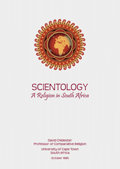In South Africa, the apartheid government did try to deny the religious status of the Church of Scientology in the early 1970s. The government’s Commission of Inquiry argued that Scientology should not be recognized as a “true church” because it allegedly did not preach the Bible as the Word of God; it did not promote a “sound doctrine” of sin and redemption; and it did not proclaim Christ as the only redeemer of humanity. Although this Commission of Inquiry decided not to recommend banning Scientology, it nevertheless found that the Church of Scientology lacked the “holiness” that was necessary for it to count as a church or a religion in South Africa.34
Ironically, this official commission refused to recognize the legitimacy of a religious movement that had offered its support to South Africa. As the Church of Scientology noted in its reply to the commission, the church and its founder had been “active in championing the cause of South Africa.”35 While the Church of Scientology was in principle a non-political religion, a church open to people of any political persuasion or commitment, L. Ron Hubbard had explicitly declared his support for South Africa in its battle against international communism. “Probably the only nation on earth with the will to truly fight subversion is South Africa,” Hubbard had written in 1961. Instead of a military solution, however, Hubbard offered the religious technology of the Church of Scientology. “To turn this tide,” he exhorted, “use E-Meters, not guns.”36
Having toured South Africa at the beginning of the 1960s, L. Ron Hubbard developed a definite interest in the country and its people. As the standard reference work for the Church of Scientology observes, “Following his visit to South Africa in the early 1960s, he predicted massive social upheavals and a severe rift between black and white communities. To avert disaster, he advised measures and provided the technology that would enable the country’s large black population to become literate.”37 Coinciding with Scientology’s legal recognition in 1975, the church created an affiliate of its Applied Scholastics International programme, which was introduced as “Education Alive,” to make its study techniques available in South Africa. According to the Church of Scientology, “In South Africa, these programs helped well over two million underprivileged black Africans improve their ability to study, well before the walls of apartheid came down or the world had even noticed.”38
Throughout the apartheid era, the church was actively involved in campaigning against the human rights abuses of separate development, Bantu education, and the mental health profession. As the church argued, psychiatry served the interests of apartheid in justifying racial separation and reinforcing the racist oppression of black South Africans.
Throughout the apartheid era, the church was actively involved in campaigning against the human rights abuses of separate development, Bantu education, and the mental health profession. As the church argued, psychiatry served the interests of apartheid in justifying racial separation and reinforcing the racist oppression of black South Africans. The church struggled to identify and expose the inhumane treatment of black patients in psychiatric hospitals. Although this campaign brought the church into conflict with the apartheid government, its concerns about racism in the South African mental health profession were echoed by the World Health Organisation, which observed in 1977 that “in no other medical field in South Africa is the contempt of the person, cultivated by racism, more concisely portrayed than in psychiatry.”39 The church’s opposition to psychiatry arises from its creed that affirms the religious basis of mental health and healing. However, in the South African context, this opposition was directed explicitly against the endemic racism that seemed to pervade the practice of psychiatry under apartheid.
Through these religious and educational initiatives, the Church of Scientology has established its place among the religions of South Africa. In recent years, the church has been an active participant in the South African chapter of the World Conference on Religion and Peace.40 In drawing up a charter for the rights and responsibilities of religious organisations in South Africa, the WCRP has been supported by the church’s commitment to religious freedom. In a new South Africa, therefore, the Church of Scientology has assumed its position within the country’s rich fabric of religious diversity.
As the philosopher William James held, every religion has a therapeutic intention. Every religion diagnoses the basic problem of the human condition, whether that problem is identified as sin, ignorance, suffering, alienation, or oppression, and proposes a cure.41 The Church of Scientology is a therapeutic religion that diagnoses the problem of the human condition and provides specific techniques of spiritual healing and an applied religious philosophy designed to cure that problem.
Although Scientology is often described as a “new religious movement,” it is not actually new. In South Africa, as we have seen, Scientology has been present for forty years. In the early 1980s, some sociologists and historians of religion predicted the decline of Scientology. They argued that the church would find difficulty in surviving the death of its founder; that its religious “science” would become outdated by changing scientific fashions; and that its spiritual “therapy” would lose “market share” to an expanding competition.42 During the intervening years, however, these predictions of the demise of Scientology have not been confirmed. As a religion that is both old and new, the Church of Scientology has continued to advance religious aspirations that have gained adherents all over the world. At the very least, the Church of Scientology merits continued recognition and attention as a religion in South Africa.
David Chidester
Professor of Comparative Religion





























